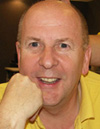The Way to the Stars
An NABC features events for everyone from the greatest in the game to those taking their first tentative steps into the world of duplicate. The latter may be wondering, can anyone become an expert at bridge with enough practice and/or training?
Does natural talent limit one’s ultimate performance level? The idea of natural talent derives from common everyday observations of some people acquiring a skill much more rapidly than others, and/or very much younger than average, and then reaching a higher ultimate performance level.
A popular view has arisen which disputes the importance of natural talent and holds that expertise just reflects extensive practice. Golfer Gary Player once said ‘The more I practice the better I get.’ Can an individual with no greater natural talent, reach elite performance levels by starting early enough and practicing extensively?
In bridge, deliberate practice might involve receiving coaching, reading bridge books, studying variations that arise in bidding, play and defence, studying deals played by top players, and using computer programmes such as Jack and Deep Finesse to identify one’s weaknesses. This acknowledges that people hit performance ceilings but suggests that this can be overcome with more of and the right kind of practice.
Motivation, amount of practice, initial success, opportunity, and possible natural talent are all interwoven. People tend to like what they are good and successful at and persist in such activities. If I wanted to be a champion boxer but lacked the strength or speed and got knocked out in the first round every time, I would inevitably abandon boxing for other interests.
Playing bridge is an obviously intellectual task and to some extent one’s progress can be monitored by the master point scheme.
A lot of practice is needed to develop bridge skill and knowledge is important.
I asked a number of players to comment on the suggestion that anyone could become an expert.
This is what they had to say:
‘I think there is a ceiling given by your natural talent.’
‘Yes if they start at a very young age.’
‘Bridge can be a nightmare if you are not gifted and want to improve.’
‘Bridge is 90% hard work and 10% talent.’
‘I have two sons. I’ve taught them bridge. One has inherited my talent (a good amateur) the other is extremely talented and a possible expert.’
‘There is always an element of natural ability in the top players.’
‘Definitely not… Top players clearly possess attributes that can’t be taught or learned,
however early one starts.’
‘Study is necessary but not sufficient – you must also play against strong opposition.’
‘Only if you read a lot and play against strong opponents.’
‘Absolutely out of the question. I have seen many players working like professionals but not reaching the same heights as a more lazy but talented player.’
When I asked what specific skills are required to attain expert level these were the most frequent comments:
‘They have a better memory, calculating ability and visualisation skills.. the best players
are able to develop these skills better and more efficiently.’
‘Bridge expertise demands a high natural skill in many different and distinct fields (calculation, spatial skills, competition, concentration, patience, etc). Top players are highly talented in almost each of these skills.’
‘They have … the killer instinct.’
‘These players have the ability to create.’
‘They are above all hard workers.’
‘Most of the top bridge players I’ve met have not struck me as having great intelligence.’
Other interesting comments on what was required included the foillowing:
‘Need to start early, play and study frequently, analyse deal, and have a mentor to
determine your mistakes.’
‘The most important is effortful study – going beyond one’s limits.’
‘At expert level , studying and preparing for specific opponents have become increasingly important.’
‘Serious analysis of one’s own play and biding system is critical.’
‘Bridge improvement is only possible with an intense study of bridge material.’
‘Not enough to have theoretical knowledge, you have to have practical experience with it as well.’
‘Bridge is about absorbing bits of information and being able to process them naturally.’
‘I find I need to play regularly to maintain form.’
‘Playing is more important than studying. Not every strong player studies the game.’
‘You have to analyse your performances – you learn from doing it.
‘For me, studying the art of calculation raised my level about 100 elo points.’
‘The right mentor is of paramount importance. Reviewing one’s performance with that person is very important.’
What can one conclude from this?
Natural talent for bridge almost certainly exists and limits ultimate performance level. It probably consists of a number of characteristics, both ability and personality. Players do get to performance ceilings after extensive practice. A special kind of practice might help overcome such a limit but ultimately natural talent probably sets a peak level. However, in bridge and in other domains, most people probably do not get anywhere near the limits of their talent because they do not get enough practice. A great deal of study and practice can propel many players further than one might have thought, but not necessarily to expert level. And, as one player suggested, ‘There is a lot of untapped natural talent in the world.’
My own view is that anyone who is prepared to read a lot, take every opportunity to watch top class players either at the table or via the medium of VuGraph or the Internet (www.bridgebase.com) play regularly and not be afraid to ask for advice has every chance of attaining a very high level of play.
I certainly hope to one day.
This article is based on a similar one on Chess by Robert Howard published in November 2008 and parts of that are reproduced with his kind permission.


